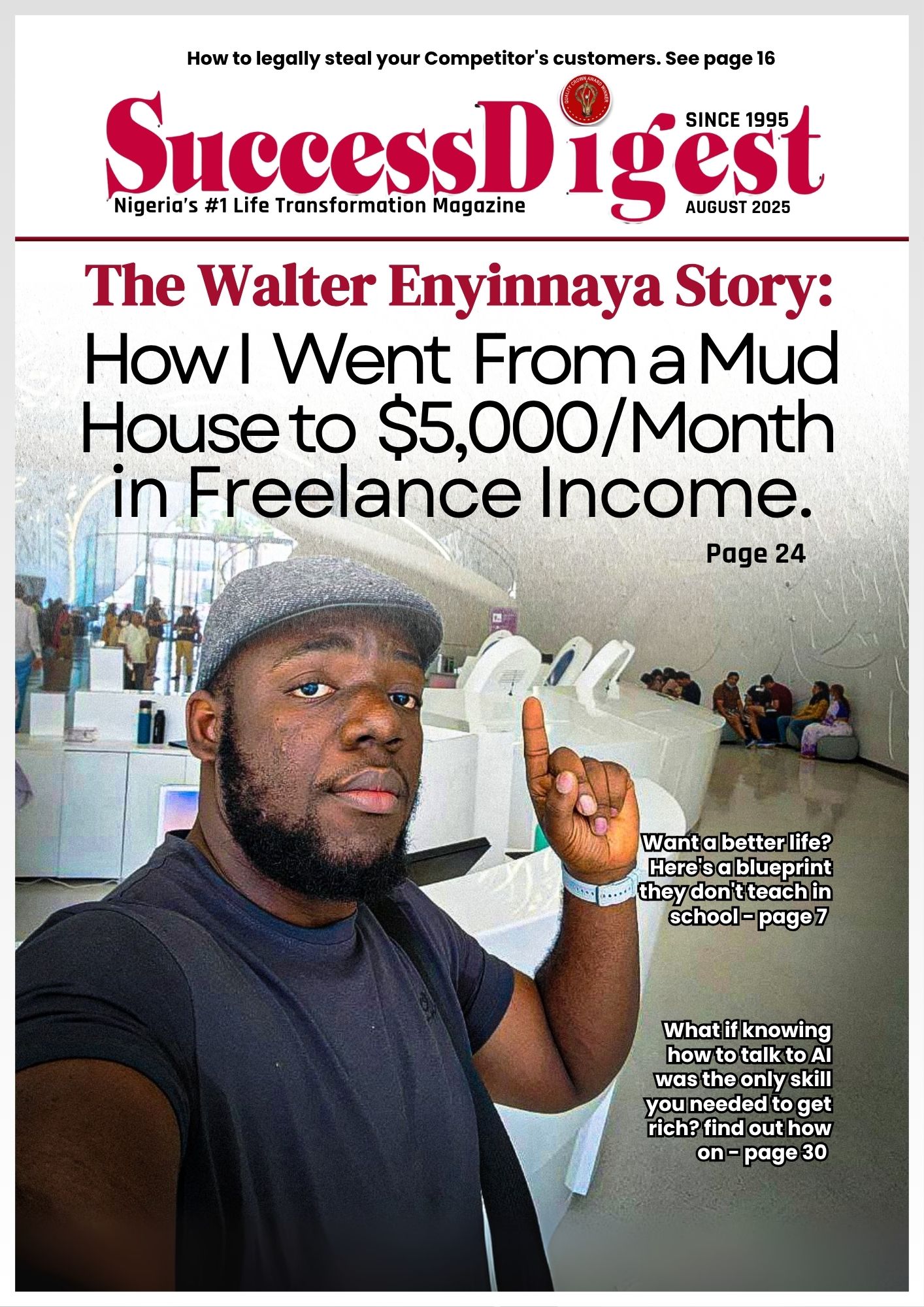A lot of people hold one or other – or all- of these notions:
- Making money goes hand in hand with being a ruthless, manipulative, amoral, greedy lizard.
- To make a bit of cash you have to sell your soul, grandmother and principles.
- Being wealthy means you end up with a heart problem, insomnia and other stress-related disorders.
- To make money you have to turn into a slime ball who sacrifices their family, morals and happiness and all on the altar of wealth.
Well, it can be like that, but it doesn’t have to be. In fact, it shouldn’t be. That’s the beauty of it. If it is like that, then you’re doing it wrong. You see, money is so freely available – and to anyone (as we looked at in Rule 1) – that you really don’t need to try that hard, or change that much. An awful lot of pretty ordinary, nice people make money – and lots of it. The staid old cliche of the cigar-chewing, high-pressure executive barking orders down a phone while signing dodgy deals probably went overboard off the Lady Ghislane.

You can make money, enjoy your job and sleep at night. You just have to decide that is what you’re going to do – no matter what. And then stick to it.
I remember a cartoon of a boardroom with fat-cat executives. A small girl pokes her head round the door and says, ‘Money can’t buy a kind smile’. The businessmen all look, momentarily, shamed. Then the chairman growls, ‘Get outta here, kid, who the hell wants a kind smile?’ and the others all look relieved and go back to their meeting.
Well, I for one would like the kind smile even if it does mean I lose a little money. I want to sleep nights and to enjoy my job and to make money. But I won’t compromise my principles, spend too little time with my family or children, neglect to sit in the sunshine occasionally, take a day off.
I won’t worry about work or money once I’ve gone to bed, be driven so much by money that I lose my sense of humour or need to have fun. These I swear by. And it is possible – believe me, I’ve known and observed enough wealthy people to know this is true – to make money and have a life, to be ethical and rich, to earn a lot and be a thoroughly nice person. It is possible. It just sometimes seems it isn’t. All part of debunking our money myths.[gspeech]
Don’t make money by being bad
I like Google’s mission statement – Don’t be evil. It’s probably an anagram of something but I still like it. If you have to lie, cheat, steal, defraud, lose sleep, hide, dodge the law in any way, break the rules or generally behave badly to make your money, then don’t do it, it isn’t worth it.
If earning money or being wealthy stops being fun – and by being bad it really will stop being fun – then there’s no point doing it. If you don’t enjoy the challenge of earning money in a decent way, then best go and do something different.
I knew a major criminal once. He told me it was no fun being ‘bent’ as, in fact, he had to be a lot more law-abiding than the rest of us. He couldn’t risk getting pulled over by the police for speeding or any minor motoring offence; no late night parties in case the police got called out; no flash car to draw attention to himself; no lavish lifestyle in case it put him in the spotlight.
But there is more to living a clean life than being able to speed or have parties. Living a life where you make your money from being good lets you sleep nights. You get to look your kids in the eye – and yourself in the mirror – with the added bonus of a feel-good factor. No amount of money that can buy that.
If you have to resort to being wicked, it means you’ve failed; you’ve lost the plot. It means you haven’t been able to do it properly. It means you’re scraping the barrel. It means you haven’t been able to think of a proper idea. It means you’ve been lazy, desperate, non-creative, boring.
I can come up with lots of examples of famous wealthy people who’ve made their money out of being bad. Yep, they’re wealthy it’s true, but look in their eyes and what do you see there? Do you want to have that stay-awake-at-night-worrying look? Do you want that flinch-when-the-doorbell-rings kind of life? You want ‘nobody trusts you’ sort of relationships? Or would you rather relax and know that you did it legit, honest, fairly? It’s a no-brainer really, isn’t it?
As long as you can earn your wealth without ripping people off, being cruel or unjust, breaking the law or bending the rules, you’ll be doing fine. All it requires is a quick check, staying connscious of what you – and your money – are doing.
Money and happiness – understand their relationship
There are lots of things that will make us miserable – losing a partner, being made redundant, getting sick. And loads more. There are quite a few related to money and gaining or spending thereof.
Remember:
- too little money can make you miserable
- too much money can make you miserable
- too much stuff can make you miserable
- not having enough can make you miserable.
I think what we have to grasp pretty well from Day 1 is that money and happiness are not necessarily the same thing. Money doesn’t buy happiness. This is a common mistake people make. It isn’t going to be one you make. You can be poor and happy. You can be rich and happy. You can also be either poor or rich and miserable.
If you are looking to wealth to make you happy, you’ll be disappointed. If you are looking to money to make you powerful younger/sexier/more vital/more interesting/better looking/whatever, you’re going to be disappointed. Sorry but money doesn’t do any of that. In your head it might. In other people’s heads it might. But it doesn’t in reality. You can be all those things with money it is true. It isn’t money that does it. The switch is thrown in your head first. Money is a placebo, not a cure.
We’ve all seen the lottery winners who buy the big house and feel miserable because they’ve left all their friends behind. Or the tycoons who lose the lot and top themselves because they felt their life was over just because they were skint.
But we won’t make any of these mistakes because we shall practise this Rule diligently and understand the relationship between money and happiness. Ah, but I hear you ask, what exactly is this Rule? What do I have to do? Answer: nothing except not expect too much from money and don’t buy stuff in the hope it will make you happy – it won’t. When they build that brand new Beemer or whatever it is you covet, they don’t build in any happiness. So when you first sit in it or buy it and you feel fantastic – and I’m not denying people do feel great buying stuff – that feeling isn’t in the thing you buy. That feeling was inside you anyway. All this said, what money can do is buy away a lot of unhappiness. It just can’t go any further than that.
Know the difference between price and value
I oce asked my delightful father-in-law to explain that thing about wine to me. You know, can a bottle that costs £100 in a top restaurant really be twenty times as good as a bottle that you can get for a fiver at the local shop?
His answer was interesting. He said that you aren’t paying for the wine alone. What you are paying for is the ambience, the service, the location (we’re talking Le Gavroche here), the wine waiter’s expertise, the good company, the fine tablecloths, the privacy and discretion, the style and class, the tradition, the food and the trust, the humidity and storage, the tone and the surroundings, the fellow dining guests and the great conversation.
The wine is almost an irrelevance and that’s the point. We think we know the price of something. But the value can spread out far beyond all of that.
I have an old Mercedes car (I like Mercs but am far too mean to buy a new one and lose all that depreciation). I didn’t pay much for it. You never do, as people are scared of them in case they go wrong, and fair enough they do cost a fortune to put right but you need to remember that because they are better made, they rarely do go wrong. I was visited by a friend who was driving a brand new car he’d just bought. A modern Eurobox, a small hatchback thing that looked like a mini spaceship.
He looked at myoId, battered, mud-streaked Merc and exclaimed, ‘Blimey, you must be doing well!’ I tried to explain that wasn’t the case and that he’d probably paid at least five times for his what I’d paid for mine but he wouldn’t have it. He saw the Merc and had decided its value was a lot more than the price – i.e. what was actually paid for it. I learnt that day about price not necessarily equating to perceived value.
Remember too that something is only worth what others are willing to pay for it. A catalogue may say the value of a painting is £500 but that’s only true if somebody is willing to pay that amount for it. An important lesson to learn. The price of something can be far less than its actual value, either to you or to somebody else. Or a lot more.
If you are going to be wealthy – and I sincerely hope you are, if you put into play the Rules in this book and work diligently at it – then it’s worth studying the difference between price and value.
Know how the wealthy think
There is a simple test to determine whether someone will end up wealthy – or if they already are. All you have to do is watch someone read their favourite newspaper, especially if it’s one of the big Sundays:
- Notice which paper they choose.
- Notice which sections they choose to read.
- Notice which sections they discard.
- Notice in which order they read their chosen sections.
This is a test for you too. Have a look at the above and make a mental note of what you do. The wealthy – those who have deliberately chosen to be wealthy rather than those who have won the lottery or inherited (God’s lottery as I think of it) or married into it – invariably:
- choose the more serious of the papers
- choose the more serious sections
- discard the ‘frivolous’ sections
- read the money/business sections first.
If you are serious about being wealthy, you will have to learn how the wealthy think. This means studying the ‘opposition’ @although very shortly you will be a part of them. You need to know the lingo and the language, where they eat and live, how they work and relax, how they invest and save.
In short, you need to study money if you are to increase your prosperity. Try to get to talk to wealthy people. Ask questions. Develop a thirst for understanding and knowledge. Read about wealthy people ðinterviews and autobiographies can be full of insight.
You may also benefit from a few well-chosen business and finance books. I’m not going to recommend any to you as I don’t know your reading style – find ones that suit you. Also, why not log on to the FT site or the finance pages of other online papers to keep up with the latest developments in the money market. Get informed.
But what if this all feels a bit too heavy? If, like me, you like the gossip columns as well as financial pages then you, like me, will probably never be extremely, mind-bogglingly over-the-top wealthy. We can still be wealthy – and we might have more fun too. Prosperous and fun – sounds good to me.
I think we have to be really passionate about money if we want lots. We have to live and breathe and sleep (yes, bearing in mind Rule 12) money. We have to study hard at the University of Wealth if we want to graduate.
Don’t envy what others have
We all set our own objectives. We all have individual ambitions. We all work out how much work we are prepared to put into this business of becoming wealthy. We all set our own limits and know what we are prepared to do or not do. So what is the point of envying what anyone else has? Not unless you know what their agenda was and is. Not unless you know how much work they were prepared to put in. Not unless you know what they were prepared to sacrifice.
Of course you can cast an envious glance at the easy three lottery, inherited, married (or divorced!) into – we all do. But money earned is entirely the business of the person earning it. They did the work. They had the idea or entrepreneurial spirit. They got up earlier than us. They were driven or fired up by what they wanted to achieve. Envying them is pointless; learning from them is invaluable.
And learning from them is the greatest gift they can give us. I deally you need a money mentor. Someone you look up to who has made a lot of money and in the right way -legally, enjoyable,y and nicely – who will give you the odd tip, tuck you under their wing, set you on the right path. And refuse to lend you any money of course. Not that you’d ask.
If I come across someone extremely rich, I immediately try to work out how they did it and if that route would suit me. What bits of information could I glean to help me get to that position, bearing in mind I only want to do it right -legally and enjoyably?
I think 90 percent of getting these Rules right is to approach getting wealthy as sympathetic magic – do as they do and you’ll end up as them.
I have my money mentor and I hang on to his every word when it comes to money as he’s living on the interest on the interest on his money – and that’s the place I’m heading for.
Use other people as a source of inspiration. Besides, envy is not a characteristic of a Rules Player – that’s you now, by the way.
It’s harder to manage yourself than it is to manage your money
So how well do you know yourself? Pretty wem Not at am Vaguely? We think we know ourselves until we come to give up smoking, lose weight, get fit, get rich. And then we realise we are lazier, have less willpower, less determination, make less effort, get too easily dissuaded, fall by the wayside too readily.
If I wanted to tuck you under my wing and make you wealthy, the first thing I would need to know is: ‘Do you have what it takes to be wealthy? Are you determined enough? Will you work hard enough? Will you stick at it? Do you have backbone? Stamina? Guts? Relentless focus?’ You see, if you don’t, the chances are you won’t succeed.
I’m not trying to put you off. I am trying to make you see, that making money is a skill that can be taught – as long as the person is ready and willing to learn and apply themselves diligently.
If you decided you wanted to win Wimbledon you would have needed to start playing tennis when you were about five and have been winning junior championships by the time you were fourteen. It’s the same with money. You can’t expect an overrweight, middle-aged person to suddenly be in the final.
When I was a young struggling student I once sold a valuable book so I could eat. I made a direct choice between owning something that was going to increase in value, and thus potenntially make me wealthy, and having a slap-up meal for one. You see what I mean? I, in essence, chose – at that time anyway – to be poor rather than wealthy. I saw the same book recently in a bookshop and, believe me, I made a bad call that day.
And what I have noticed is that the wealthy – when they are starting out anyway – have enormous drive and are prepared to make enormous sacrifices. They manage themselves and forego instant rewards for bigger payback in the longer term. Selffcontrol and delayed gratification are useful arts to learn.
Also Read: THE KING IS CENTRAL TO HIS KINGDOM















